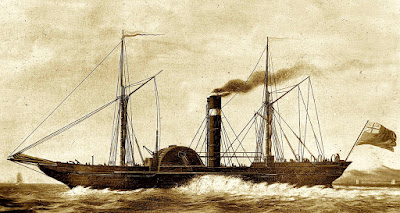First edition - July 1822.
A strange 'jerky' book; in fact, rather a hodgepodge or hotchpotch. It is purportedly the adventures of one Thomas Duffle, cloth-merchant in the Salt Market of Glasgow, who, on the advice of his worthy landlady Mrs MacLecket, decides to try the benefit of the sea air in the steam-boat to Greenock. Listening to several stories/reminiscences by fellow passengers, he ventures to come before the public in the book-making line. He not only describes the passengers, but relates their tales - he is encouraged to do this by his neighbour, Mr. Thomas Sweeties the grocer, and his landlady.
Galt is amusing about the rivalries between Greenock and Port-Glasgow and shows his usual wonderful turns of phrase when describing his characters. There is the talkative gentlewoman of no great capacity, sadly troubled with a weakness of parts about her intellectuals. I seem to recall one character from a previous Galt novel - the daft laddie, when he was asked what took him so often to Greenock, - "It's a fine place," quo' Jemmy, "for a' the folk there are just like mysel." The two mini-voyages, up and down the Clyde, takes us to page 149 of a 359 page book. Then it appears to veer off into a totally different work. True, it still concerns Mr. Duffle, but he is now off to Edinburgh and then London to witness the coronation of King George IV (pages 150 -283).
Early Clyde Steam-Boat
It gives the Author an opportunity to bring back two of his well-known characters - Doctor and Mrs Pringle from Garnock, who are on the same boat, travelling to London to see their pregnant daughter Rachel and her husband Captain Sabre. Thank goodness, the reader doesn't have to put up with Mrs. Pringle's appallingly spelt letters this time! The Coronation scenes are mediocre, with only flashes of decent Galtisms. Quite amusing is the kitting out of poor Duffle in some clearly dreadful and old-fashioned clothes for the event. Duffle is accorded kudos by the Londoners for being the Mr. Duffle of Blackwood's Magazine. Even better, he meets the Author of Waverley (a most comical novel, that the Doctor read, and thought was a true history book). When the great Sir Walter - after some familiar interchange of the eye had taken place between him and me; and when he understood that my name was Duffle, and that I corresponded in a secret manner with Mr Blackwood, the bookseller in Edinburgh, he said that he had been juyst like to die at some of my writings, which I was very well pleased to hear...` I liked the later reference to the GREAT UNKNOWN, as some call him, when he put out his tale of Old Mortality, true Presbyterians conceived that he had laid an irreverent hand on the ark of our great national cause, the Covenant; and, animated by the spirit of ancient zeal, immediately began to repair the tombs of the martyrs...
There a humorous paragraph relating to a matronly woman, on the same return voyage to Edinburgh from London: "Madam...as ye seem to have had some experience of man, ye'll just gie us a bit tig and gae by, in the shape of some wee couthy tale; and, to help oil the hinge of your tongue, hae, take a glass o' wine." One or two of the tales I enjoyed, such as The Wig and the Black Cat; Travelling By Night; The Buried Alive; The Covenanter (a rejoinder to Scott's novel) and Mrs Ogle of Balbogle. Galt (or, his mouthpiece Duffle) is also pleasingly cattish about the citizens of Edinburgh discoursing about its beautiful prospects, and its other kinds of beatitudes and superiorities, physical and metaphysical.
Galt seems to have spoken from the heart when he wrote the following: nor can I say that I hae ony particular fondness for critics at all, especially since I began to put out my writings, for it is well known that they are creatures of no mercy, but just like wasps and clegs, delight and make their living by tormenting poor authors, who are the useful cattle and milch cows of literature.
He would not have liked this contemporary review by Francis Jeffrey of The Steam-Boat (Secondary Scottish Novels, Edinburgh Review, October 1823): His next publication, however, though only in one volume, is undoubtedly the worst of the whole - we allude to the thing called 'The Steam-Boat', which has really no merit at all; and should never have been transplanted from the Magazine in which we are informed it first made its appearance. With the exception of some trash about the Coronation, which nobody of course could ever look at three months after the thing itself was over, it consists of a series of vulgar stories, with little either of probability or originality to recommend them. Certainly, one accepts that The Steam-Boat makes no real sense in book form - it is much better suited to a magazine format; but, even there, the failure to end several of the stories irritates the reader, even if the author's plan was to be humorous and 'practical (the narrators are having to leave the boat).



No comments:
Post a Comment